sysd/src/main.c File Reference
#include "config.h"#include <glib.h>#include <gtk/gtk.h>#include <signal.h>#include <stdlib.h>#include <stdio.h>#include <string.h>#include <unistd.h>#include <sys/time.h>#include <time.h>#include <liberipc/eripc.h>#include <liberutils/display_utils.h>#include "log.h"#include "busy.h"#include "conf.h"#include "display.h"#include "connections.h"#include "hal.h"#include "ipc.h"#include "process.h"#include "system.h"#include "tasks.h"#include "xwindow.h"
Go to the source code of this file.
Functions | |
| static void | usage (const char *argv_0) |
| static void | parse_arguments (int argc, char **argv) |
| static void | on_sigterm (int signo) |
| static long int | read_timestamp (const char *path) |
| static gboolean | check_set_datetime (void) |
| static void | on_phase_3_complete (void) |
| static void | start_phase_3 (void) |
| static void | on_phase_2_complete (void) |
| static void | start_phase_2 (void) |
| static void | on_phase_1_complete (void) |
| int | main (int argc, char *argv[]) |
Variables | |
| static gboolean | do_detach = FALSE |
Function Documentation
| static gboolean check_set_datetime | ( | void | ) | [static] |
Definition at line 200 of file sysd/src/main.c.
References LOGPRINTF, and read_timestamp().
Referenced by start_phase_2().
00201 { 00202 gboolean need_set = FALSE; 00203 struct timeval tod; 00204 long int ts = 0; 00205 00206 ts = read_timestamp("/etc/timestamp"); 00207 00208 // now get the current time 00209 gettimeofday(&tod, NULL); 00210 LOGPRINTF("timeofday = %ld", tod.tv_sec); 00211 00212 if (ts < tod.tv_sec) 00213 { 00214 LOGPRINTF("timestamp < timeofday"); 00215 // do nothing 00216 } 00217 else 00218 { 00219 need_set = TRUE; 00220 } 00221 00222 return need_set; 00223 }


| int main | ( | int | argc, | |
| char * | argv[] | |||
| ) |
Definition at line 343 of file sysd/src/main.c.
References busy_add_foreground(), BUSY_DIALOG_NONE, conf_set_services(), display_gain_control(), display_set_services(), do_detach, hal_set_services(), ipc_set_services(), LOGPRINTF, on_phase_1_complete(), on_sigterm(), parse_arguments(), process_add(), PS_RESPAWN, PS_WAIT_STARTED, sys_set_services(), and window_set_services().
00344 { 00345 struct sigaction on_term; 00346 00347 // parse command-line arguments 00348 parse_arguments(argc, argv); 00349 00350 // catch the SIGTERM signal 00351 memset(&on_term, 0x00, sizeof(on_term)); 00352 on_term.sa_handler = on_sigterm; 00353 sigaction(SIGTERM, &on_term, NULL); 00354 00355 if (do_detach) 00356 { 00357 if (daemon(0, 0) !=0) 00358 { 00359 LOGPRINTF("Daemonize error: %s", strerror(errno)); 00360 exit (1); 00361 } 00362 } 00363 00364 // init gdk (for windowing) 00365 g_type_init(); 00366 gtk_init(&argc, &argv); 00367 00368 // prepare IPC, system (micro) and display 00369 ipc_set_services(); 00370 window_set_services(); 00371 sys_set_services(); /* relies on ipc */ 00372 display_set_services(); /* relies on system/micro and window*/ 00373 busy_add_foreground(0, BUSY_DIALOG_NONE, NULL); 00374 00375 // prepare GConf 00376 conf_set_services(); 00377 00378 // prepare HAL and mountpoints 00379 hal_set_services(); 00380 display_gain_control(); 00381 00382 // spawn applications 00383 process_add("/usr/bin/popupmenu", NULL, NULL, NULL, PS_WAIT_STARTED | PS_RESPAWN); 00384 process_add("/usr/bin/uds", NULL, G_CALLBACK(on_phase_1_complete), NULL, PS_WAIT_STARTED | PS_RESPAWN); 00385 00386 // run the main loop 00387 LOGPRINTF("before gtk_main"); 00388 gtk_main(); 00389 LOGPRINTF("after gtk_main"); 00390 00391 return 0; 00392 }
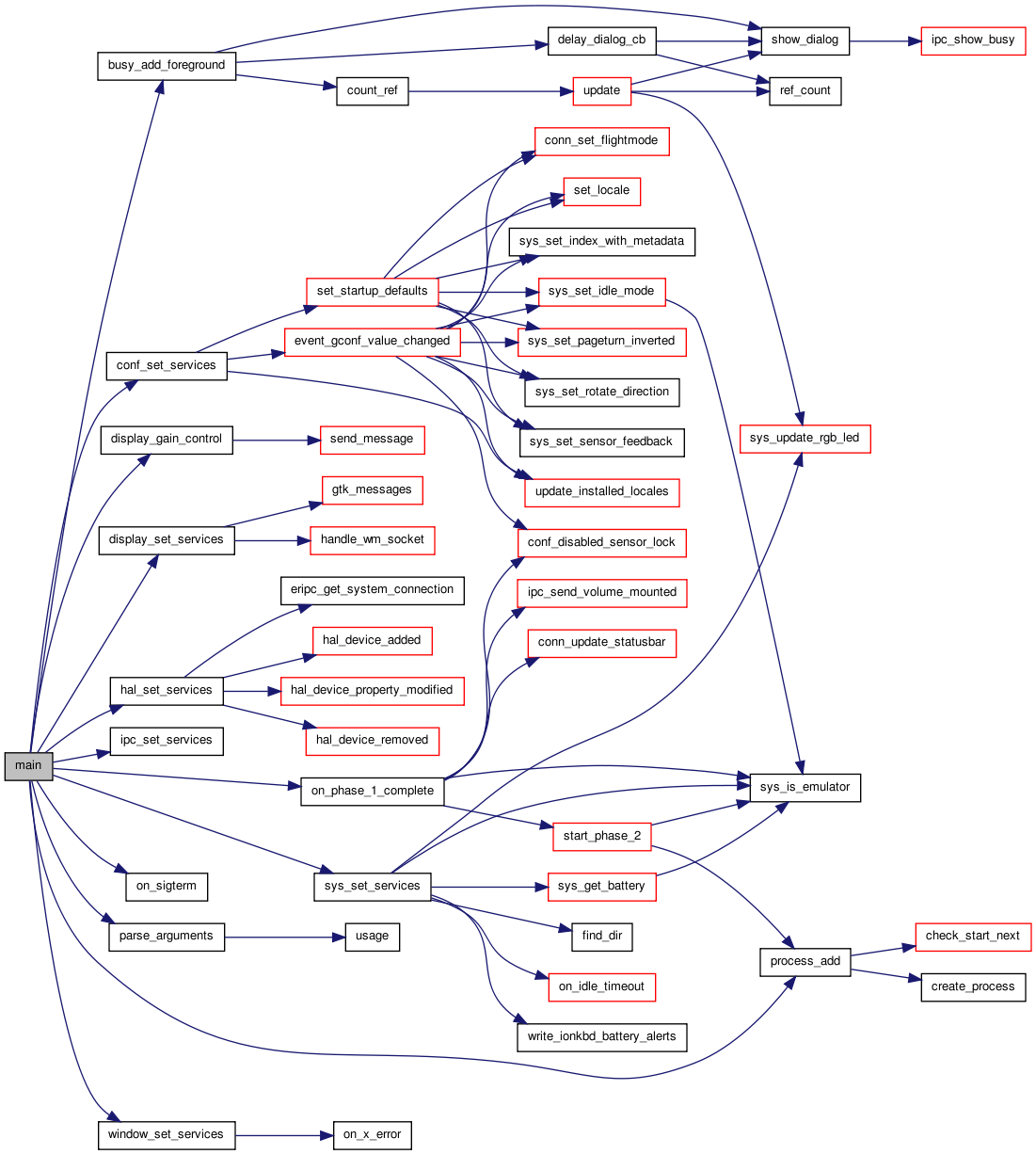
| static void on_phase_1_complete | ( | void | ) | [static] |
Definition at line 325 of file sysd/src/main.c.
References conf_disabled_sensor_lock(), conn_update_statusbar(), ipc_send_volume_mounted(), LOGPRINTF, MOUNTPOINT_CARD, start_phase_2(), and sys_is_emulator().
Referenced by main().
00326 { 00327 LOGPRINTF("entry"); 00328 00329 #if MACHINE_IS_DR1000S || MACHINE_IS_DR1000SW 00330 conf_disabled_sensor_lock(); 00331 #endif 00332 conn_update_statusbar(); 00333 00334 if (!sys_is_emulator()) 00335 { 00336 ipc_send_volume_mounted(MOUNTPOINT_CARD); 00337 } 00338 00339 start_phase_2(); 00340 }
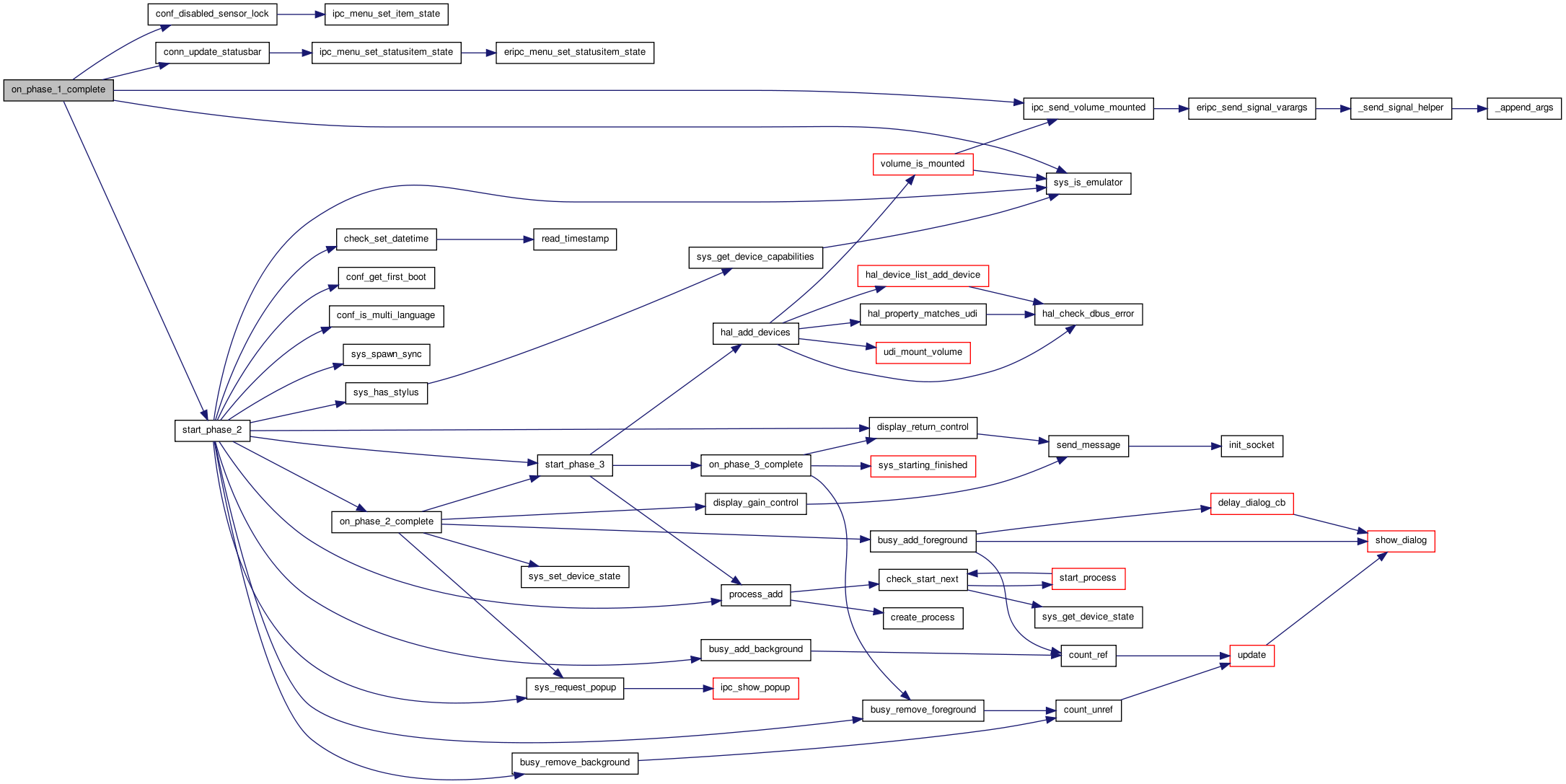

| static void on_phase_2_complete | ( | void | ) | [static] |
Definition at line 249 of file sysd/src/main.c.
References busy_add_foreground(), BUSY_DIALOG_NONE, display_gain_control(), LOGPRINTF, start_phase_3(), STATE_DEVICE_STARTED, sys_request_popup(), and sys_set_device_state().
Referenced by start_phase_2().
00250 { 00251 LOGPRINTF("entry"); 00252 00253 busy_add_foreground(0, BUSY_DIALOG_NONE, NULL); 00254 display_gain_control(); 00255 sys_request_popup("localunblock"); 00256 00257 sys_set_device_state(STATE_DEVICE_STARTED); 00258 00259 start_phase_3(); 00260 }
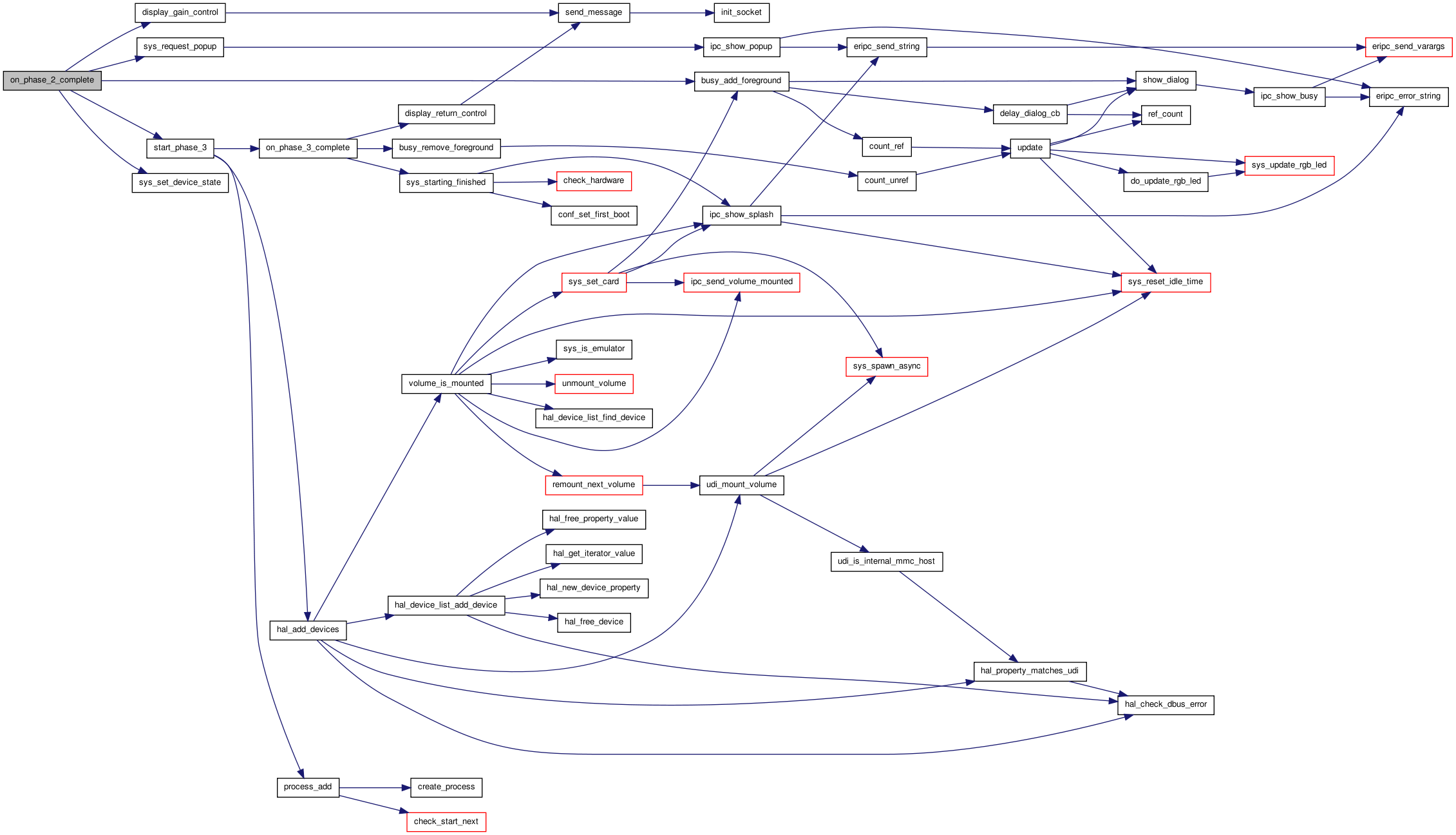

| static void on_phase_3_complete | ( | void | ) | [static] |
Definition at line 226 of file sysd/src/main.c.
References busy_remove_foreground(), display_return_control(), LOGPRINTF, and sys_starting_finished().
Referenced by start_phase_3().
00227 { 00228 LOGPRINTF("entry"); 00229 00230 // all apps started, stop busy and allow display updates again 00231 busy_remove_foreground(0); 00232 display_return_control(); 00233 00234 sys_starting_finished(); 00235 }


| static void on_sigterm | ( | int | signo | ) | [static] |
Definition at line 128 of file sysd/src/main.c.
References WARNPRINTF.
Referenced by main().
00129 { 00130 WARNPRINTF(" -- entry " PACKAGE_NAME ", my pid [%d]", getpid()); 00131 00132 // stop main process, prepare to quit application 00133 gtk_main_quit(); 00134 00135 WARNPRINTF(" -- leave " PACKAGE_NAME); 00136 }

| static void parse_arguments | ( | int | argc, | |
| char ** | argv | |||
| ) | [static] |
Definition at line 109 of file sysd/src/main.c.
References do_detach, and usage().
Referenced by main().
00110 { 00111 int i; 00112 00113 // parse contentLister options 00114 for (i = 1 ; i < argc ; i++) 00115 { 00116 if (strcmp(argv[i], "--help") == 0) 00117 { 00118 usage(argv[0]); 00119 } 00120 if (strcmp(argv[i], "--detach") == 0) 00121 { 00122 do_detach = TRUE; 00123 } 00124 } 00125 }


| static long int read_timestamp | ( | const char * | path | ) | [static] |
Definition at line 139 of file sysd/src/main.c.
References LOGPRINTF.
Referenced by check_set_datetime().
00140 { 00141 FILE* thefile = NULL; 00142 size_t result; 00143 char tbuffer[20]; 00144 char buf[20]; 00145 const char* timeformat = "%m%d%H%M%Y" ; // current timestamp format 00146 struct tm mytime; 00147 00148 long int ts = -1 ; // 0 = epoch 00149 00150 thefile = fopen(path, "r"); 00151 if (NULL == thefile) 00152 { 00153 // only allow positive time, 0 = 1970-01-01 00:00 00154 goto error_fopen; 00155 } 00156 bzero(tbuffer, sizeof(tbuffer)); 00157 bzero(buf, sizeof(buf)); 00158 bzero(&mytime, sizeof(struct tm)); 00159 result = fread((void*) tbuffer, sizeof(char), 20, thefile); 00160 if ( result > 0 && result <= sizeof(tbuffer) ) 00161 { 00162 // transform to epoch time 00163 LOGPRINTF("Read timestamp from file: [%s]", tbuffer); 00164 00165 // timestamp string to time struct 00166 strptime(tbuffer, timeformat, &mytime); 00167 00168 // time is seconds since epoch 00169 result = strftime(buf, sizeof(buf), "%s", &mytime); 00170 00171 if ( result > 0 && result < sizeof(buf) ) 00172 { 00173 LOGPRINTF("Old time stamp: [%s], New timestamp (secs since epoch) [%s]", tbuffer, buf); 00174 } 00175 00176 // buf now holds a time stamp, compare to 00177 // translate to int 00178 ts = strtol(buf, NULL, 10); 00179 goto exit; 00180 } 00181 else 00182 { 00183 goto error; 00184 } 00185 00186 error: 00187 ts = -1; 00188 exit: 00189 if (NULL != thefile) 00190 { 00191 fclose(thefile); 00192 } 00193 return ts; 00194 00195 error_fopen: 00196 return -1; 00197 }

| static void start_phase_2 | ( | void | ) | [static] |
Definition at line 263 of file sysd/src/main.c.
References busy_add_background(), busy_remove_background(), busy_remove_foreground(), check_set_datetime(), conf_get_first_boot(), conf_is_multi_language(), display_return_control(), LOGPRINTF, on_phase_2_complete(), process_add(), PS_WAIT_EXIT, start_phase_3(), sys_has_stylus(), sys_is_emulator(), sys_request_popup(), and sys_spawn_sync().
Referenced by on_phase_1_complete().
00264 { 00265 LOGPRINTF("entry"); 00266 00267 // complex solution to make sure the menu is blocked before the 00268 // first app starts and unblocked after the last app exists 00269 gboolean run_firstboot = FALSE; 00270 gboolean run_gtktscal = FALSE; 00271 gboolean run_datetime = FALSE; 00272 00273 if (conf_get_first_boot()) 00274 { 00275 if (conf_is_multi_language()) 00276 { 00277 run_firstboot = TRUE; 00278 } 00279 00280 if (sys_has_stylus() && !sys_is_emulator()) 00281 { 00282 run_gtktscal = TRUE; 00283 } 00284 } 00285 00286 if (check_set_datetime()) 00287 { 00288 run_datetime = TRUE; 00289 } 00290 00291 if (run_firstboot || run_gtktscal || run_datetime) 00292 { 00293 sys_request_popup("localblock"); 00294 busy_remove_foreground(0); 00295 display_return_control(); 00296 00297 if (run_firstboot) 00298 { 00299 process_add("/usr/bin/settings --firstboot", NULL, NULL, run_gtktscal || run_datetime ? NULL : G_CALLBACK(on_phase_2_complete), PS_WAIT_EXIT); 00300 } 00301 00302 if (run_gtktscal) 00303 { 00304 process_add("/usr/bin/gtktscal -firstboot", NULL, NULL, run_datetime ? NULL : G_CALLBACK(on_phase_2_complete), PS_WAIT_EXIT); 00305 } 00306 00307 if (run_datetime) 00308 { 00309 // set busy to make sure the system does not suspend 00310 busy_add_background(0); 00311 sys_spawn_sync("date `cat /etc/timestamp` && /sbin/hwclock --systohc --utc"); 00312 busy_remove_background(0); 00313 00314 // show time/date settings dialog 00315 process_add("/usr/bin/settings --fdatetime", NULL, NULL, G_CALLBACK(on_phase_2_complete), PS_WAIT_EXIT); 00316 } 00317 } 00318 else 00319 { 00320 start_phase_3(); 00321 } 00322 }
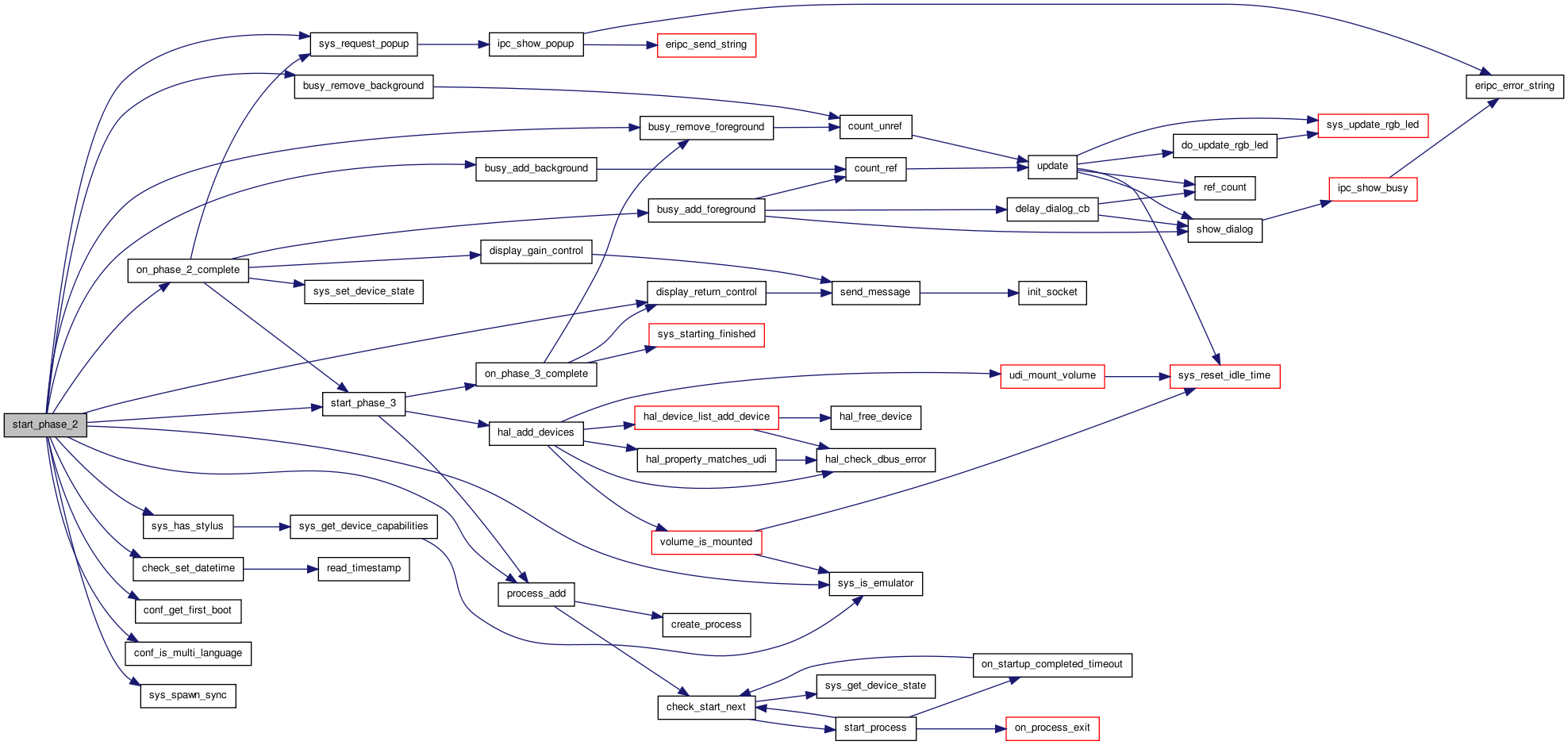

| static void start_phase_3 | ( | void | ) | [static] |
Definition at line 238 of file sysd/src/main.c.
References hal_add_devices(), LOGPRINTF, on_phase_3_complete(), process_add(), PS_RESPAWN, and PS_WAIT_STARTED.
Referenced by on_phase_2_complete(), and start_phase_2().
00239 { 00240 LOGPRINTF("entry"); 00241 00242 // detect hardware, mount volumes 00243 hal_add_devices(); 00244 00245 process_add("/usr/bin/ctb", NULL, G_CALLBACK(on_phase_3_complete), NULL, PS_WAIT_STARTED | PS_RESPAWN); 00246 }
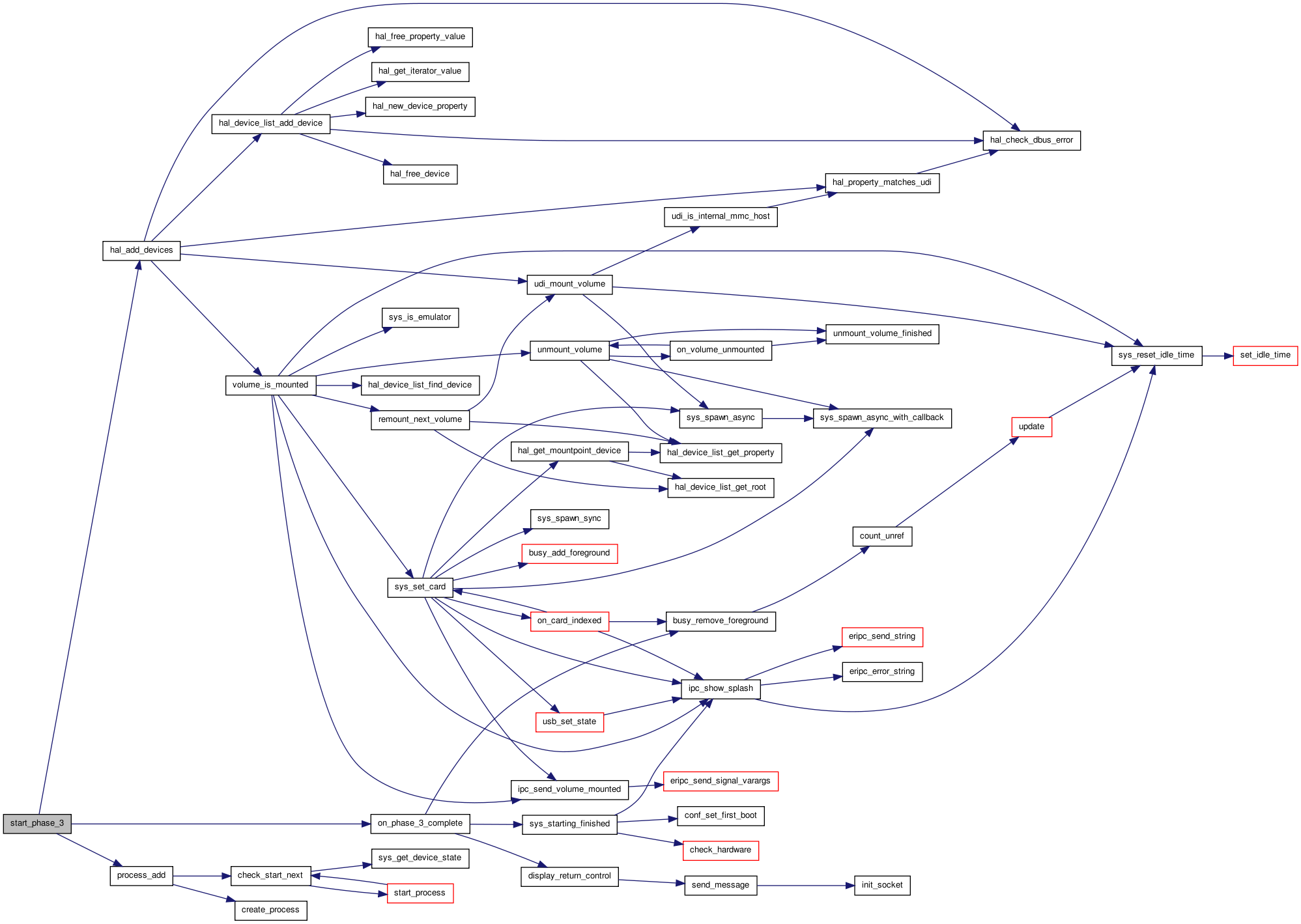

| static void usage | ( | const char * | argv_0 | ) | [static] |
Definition at line 92 of file sysd/src/main.c.
00093 { 00094 static const char *usage_text = 00095 "\n" 00096 "usage: %s [options]\n" 00097 "\n" 00098 "options:\n" 00099 " --help\n" 00100 " Print help text and quit\n" 00101 " --detach\n" 00102 " Detach from console to run as daemon\n"; 00103 printf(usage_text, argv_0); 00104 00105 exit(1); 00106 }
Variable Documentation
gboolean do_detach = FALSE [static] |
Copyright (C) 2008 iRex Technologies B.V. All rights reserved.
Definition at line 79 of file sysd/src/main.c.
Referenced by main(), and parse_arguments().
 1.6.2-20100208
1.6.2-20100208